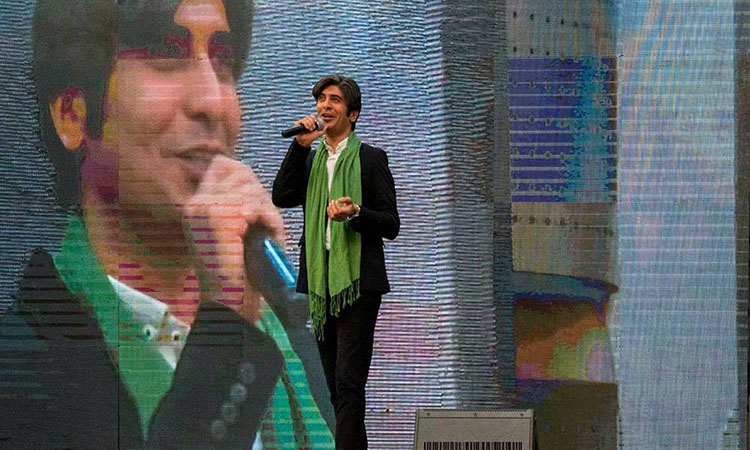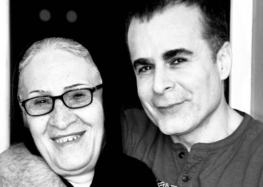Iranian Singer Offered Bribes in Exchange for Cooperating with Rouhani Government

Arya Aramnejad Says Repression Has Continued Under New President
Iranian pop singer Arya Aramnejad has been indefinitely banned from engaging in any musical activity by Iran’s Culture and Islamic Guidance Ministry and offered bribes in exchange for cooperating with the government of President Hassan Rouhani, he told the Center for Human Rights in Iran (CHRI).
“After Rouhani’s first government was formed [in 2013], I immediately contacted the guidance ministry to try to resume my work in a legal framework… I had three meetings with a ministry official who wanted me to give an interview and express remorse for my political views,” said Aramnejad. “He said I was a good person and a national treasure who should not be held back by politics. He said if I cooperated, my music production costs would be paid. Then he promised to organize a concert for me at Tehran’s Milad Tower. I told him I would not in any way express regret for my past songs and won’t give any commitments.”
Frustrated by the ministry’s refusal to allow him to produce his music, Aramnejad took to social media, revealing his discussions with then-Culture and Islamic Guidance Minister Ali Jannati.
“In private messages, Jannati accused me of seeking fame, but I was already famous; I didn’t need to make more publicity for myself,” Aramnejad told CHRI.
He added that after Jannati was replaced by Abbas Salehi Amiri in October 2016, Amiri promised Aramnejad that he could resume his artistic activities, but nothing came of the pledge.
Formerly imprisoned for the political nature of some of his music under the administration of President Mahmoud Ahmadinejad (2005-13), Aramnejad told CHRI in an interview on September 27, 2017, that the Islamic Republic maintains red lines that can land artists in jail and repression has continued under Rouhani.
“The officials understand that music is impactful, even more than film and literature… and the ruling establishment has come to the conclusion that it is good to allow criticism up to a point, for instance against the president or the nuclear deal, but further than that there is a red line we should not cross. That’s what a guidance ministry official told me,” said Aramnejad.
“But individuals like me cannot be controlled,” he added. “We are a problem and the state cannot let us be free.”
In the interview with CHRI, Aramnejad, who is based in the Iranian city of Bobol in Mazandaran Province, detailed his experiences with the Culture and Islamic Guidance Ministry, which regulates all media and artistic production in Iran.
“Last week a director at the guidance ministry contacted me and said that, based on a letter received from a certain agency, my activities will be suspended until a decision is made about me,” said Aramnejad. “I asked how long will this suspension last and was told that a meeting will be held in a month to see if I can get back to my work or not.”
Aramnejad, 34, was briefly detained on February 15, 2010 for his song “Ali Barkhiz” (Ali Rise Up!) in support of the pro-reform Green Movement that arose out of the protests against Iran’s disputed 2009 presidential election.
He was arrested again on November 8, 2011, for continuing to sing political songs, notably Deltangi (Homesick) in support of Mir Hossein Mousavi, who ran for president in 2009 and has been under extrajudicial house arrest since 2011 for leading the 2009 protests.
Aramnejad was released after spending six months in the Intelligence Ministry’s detention center in Babol and 34 days in solitary confinement in the city’s Mati Kola Prison.
He also spent three months in prison in 2012 after being convicted on the basis of Article 500 of Iran’s Islamic Penal Code, which states, “Anyone who engages in any type of propaganda against the Islamic Republic of Iran or in support of opposition groups and associations, shall be sentenced to three months to one year of imprisonment.”
From that point on Aramnejad was unable to continue his professional career despite having no court convictions banning him from musical activities.
Pressured by Rouhani Admin Officials
“Since my release [in April 2012], I haven’t been able to publish a single song,” Aramnejad told CHRI. “The Culture and Islamic Guidance Ministry gave me permission to publish two of my love songs, but they have not gone into musical production yet. I also submitted an album to the ministry for approval last year. Some of the songs are romantic; others have political and social messages. The authorities did not approve it for distribution. Then, three months ago, they told me the lyrics for the songs were illegible even though we had submitted the lyrics in typing, as required.”
The musician continued: “Before Rouhani came to power, the guidance ministry officials were insistent that I must sign a pledge saying that I would no longer sing political songs before any of my work could be approved,” he said. “But I wouldn’t give such a commitment and there was no room for discussion.”
After his release from prison in April 2012 until Rouhani’s first election in June 2013, Aramnejad says he was frequently summoned to the Intelligence Ministry to answer questions about his statements on social media.
“Under Rouhani’s government, there have been fewer summons,” he said. “But last year my case supervisor at the Intelligence Ministry changed and the new official gave me an ultimatum to keep quiet or face judicial action.”






